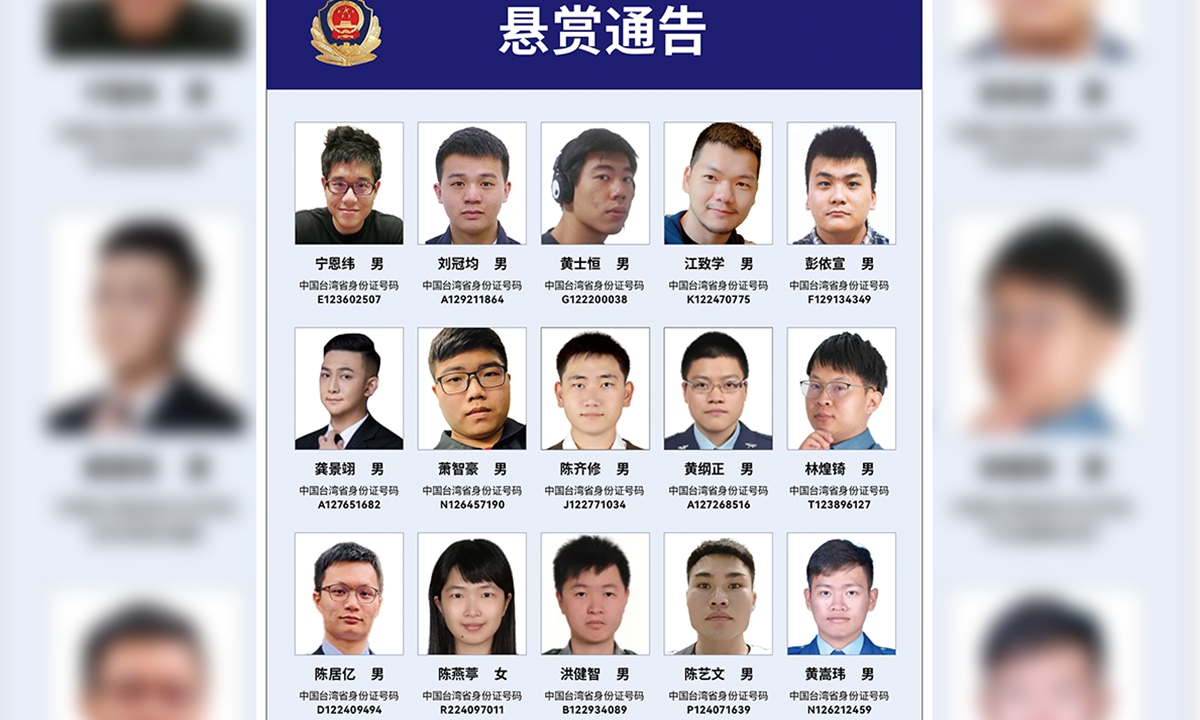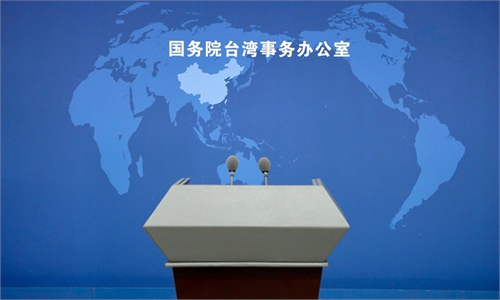Mainland launches coordinated actions targeting ‘Taiwan independence’ separatists
Wanted notice issued for 20 Taiwan-based cyberattack suspects

Photo: From Guangzhou Municipal Public Security Bureau's Tianhe District Branch
The Chinese mainland on Thursday launched a series of actions targeting "Taiwan independence" separatists, including issuing a wanted notice with rewards for 20 key suspects involved in cyberattacks against a mainland company, exposing the Democratic Progressive Party (DPP) authorities' so-called "internet army," and announcing bans on a Taiwan-based company linked to a die-hard separatist.
Analysts reached by the Global Times said the mainland's coordinated measures send a clear signal to the separatists in Taiwan island that as long as there is any push for "Taiwan independence," the mainland will resolutely oppose it and punitive actions will follow.
The Chinese mainland on Thursday announced bans on a Taiwan company related to Shen Pao-yang, also known as Puma Shen, who is a die-hard supporter of "Taiwan independence," from making deals or cooperating with organizations, businesses and individuals in the mainland, according to the Xinhua News Agency.
Zhu Fenglian, a spokesperson for the Taiwan Affairs Office of the State Council, announced the punishment on Sicuens International Co., Ltd., a company led by Shen's father, noting that the mainland will also take other necessary measures against the company. The company engages in trade and business cooperation with certain mainland enterprises in pursuit of economic benefits.
"The mainland side will never allow enterprises related to die-hard 'Taiwan independence' supporters to seek profits in the mainland," said the spokesperson.
In October 2024, the office announced punishments on Shen and the Kuma Academy, an institution led by him. The office said that Shen had been actively and systematically organizing activities promoting "Taiwan independence." He has also deliberately promoted "Taiwan independence" and "anti-China" ideologies, particularly targeting the young people in Taiwan. Meanwhile, the Kuma Academy has openly fostered violent "Taiwan independence" individuals under the guise of training and outdoor activities, according to Xinhua.
On Tuesday, the Hong Kong-based Wen Wei Po released an article on its website saying that Shen portrays himself as a vocal vanguard against the mainland, but behind the scenes, he acts more like a salesman for the mainland. While he publicly denounces the mainland, few realize that his family has been quietly cooperating with mainland businesses, purchasing goods at low prices and reselling them in markets such as Ecuador at a significant markup.
The mainland has placed Shen and other die-hard "Taiwan independence" separatists on a sanctions list, barring them and their families from entering the mainland, Hong Kong, and Macao SARs. Sanctions on Shen-linked companies underscore the mainland's firm stance that any attempt to split the country will be punished. Authorities will hold offenders criminally accountable for life, Zheng Jian, a professor at the Taiwan Research Institute of Xiamen University, told the Global Times on Thursday.
Nowhere to hide
Also on Thursday, the Guangzhou Municipal Public Security Bureau's Tianhe District Branch in South China's Guangdong Province released a wanted notice with reward for 20 key suspects from the Taiwan island who were involved in the cyberattack targeting a Guangzhou tech company.
This marks the first time the public security authorities have taken law enforcement action to strike against "Taiwan independence" separatist forces, as well as the first coordinated crackdown on organized online criminal activities of the "Information, Communications and Electronic Force Command."
The notice said the cyberattack was directed and carried out by the DPP's "Information, Communications and Electronic Force Command" involving multiple suspected illegal activities. The notice disclosed the suspects' names, genders, and ID numbers in the Taiwan island, including the information of one female suspect.
The notice reads that the public is encouraged to actively provide leads. People who provide valid clues to the authorities, as well as individuals who assist in apprehending the suspects, will be rewarded with 10,000 yuan ($1,391) for each suspect.
Shortly after receiving the report and issuing a police notice, authorities swiftly gathered evidence and identified the perpetrators. This demonstrates that in combating cybercrime of the "Taiwan independence" separatists, law enforcement not only possesses overwhelming technical advantages in both offense and defense, but has also been closely monitoring their cybercrime trends over the long term, with a thorough understanding of the key individuals, methods, and patterns involved, Zhuo Hua, an international affairs expert at the School of International Relations and Diplomacy at Beijing Foreign Studies University, told the Global Times.
In recent years, the national judicial system for punishing separatism in accordance with the law has been continuously refined, and it has now entered a stage of effective enforcement. The wanted notices issued by public security authorities demonstrate their determination and capability to hold accountable, pursue, and prosecute those involved in organized cybercrimes originating from Taiwan Province for life, said the expert.
On Thursday, the National Computer Virus Emergency Response Center, the National Engineering Laboratory for Computer Virus Prevention Technology and 360 Digital Security Group jointly released a report which exposed the insider information such as historical background, organizational structure, personnel composition, work locations, operational tasks and examples of cyberattack cases of the DPP's "Information, Communications and Electronic Force Command."
The report, titled An ant trying to shake a tree - an investigation report on cyberattack activities of the DPP's "Information, Communications and Electronic Force Command," said the unit has been involved in large-scale theft of sensitive data and critical intelligence, supporting anti-China forces in the US in launching public opinion and cognitive warfare campaigns against the mainland. It has also covertly incited "color revolutions," aiming to disrupt public order, sow ethnic divisions, exacerbate social tensions and obstruct national reunification.
The report also unveiled cases of cyberattacks launched by the hacker groups targeting the mainland. In 2024, the DPP authorities, in collusion with external forces, continued to engage in "independence" provocations, seriously jeopardizing cross-Straits relations and peace and stability in the Taiwan Straits.
Zheng Jian, the professor from Xiamen University, said the mainland's latest measures on Thursday send a strong and clear signal against "Taiwan independence," directly responding to Lai Ching-te's recent separatist actions.
The mainland's stance and crackdown on separatism remain firm, said Zheng, warning that even covert online operatives can be tracked and punished, with the recent exposure of 20 such individuals being only a small part of the broader effort to crackdown on separatists.
The deterrent effect of the coordinated measures and law enforcement actions would be self-evident. Those who continue to push for the "Taiwan independence" agenda will be held accountable and face consequence, said the expert.


